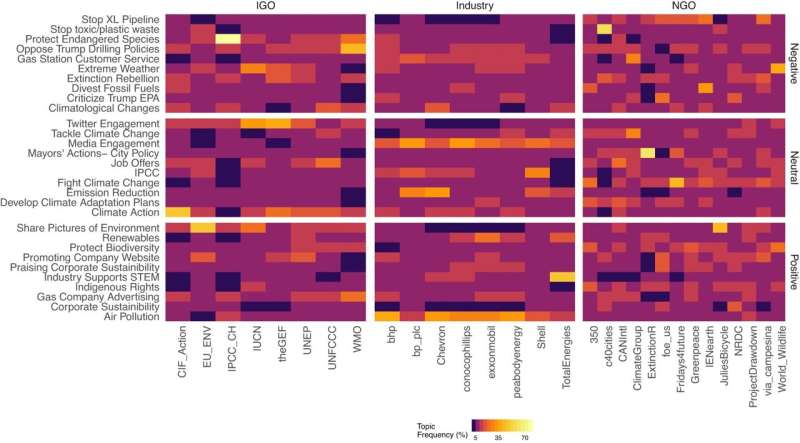This article has been reviewed according to Science X's editorial process and policies. Editors have highlighted the following attributes while ensuring the content's credibility:
fact-checked
peer-reviewed publication
trusted source
proofread
Emissions and evasions in the battle against climate change

The world's top fossil fuel firms subtly reset online conversations about climate change by ignoring discussions of extreme weather in favor of sharing praise for their own sustainability work, according to a new research paper in Nature's npj | Climate Action series.
Over half a million social media posts on X (formerly Twitter) were studied using artificial intelligence-assisted language/rhetoric analysis to reveal how fossil fuel companies, intergovernmental organizations (IGOs) and non-governmental organizations (NGOs) interact online in conversations about climate change, including responses to climate change-related extreme weather.
Researchers from the University of Cambridge, Harvard University, and the California Institute of Technology found that the fossil fuel industry rarely responds to online discussions about extreme weather such as storms, droughts, extreme temperatures, and wildfires.
Instead, fossil fuel firms were more likely to respond to an increase in NGO and IGO posts about the oil industry's support for Science, Technology, Engineering, and Math (STEM) and praise for corporate sustainability initiatives.
Additionally, fossil fuel companies are also more likely to post about any actions taken to mitigate air pollution with a positive tone while posting more negatively about "phony paid protesters" and "false allegations."
"When fossil fuel companies 'cherry-pick' which climate information they react to, this can bias how their audience thinks about climate change," said co-lead author Assistant Professor Ramit Debnath, a Cambridge Zero Fellow at the University of Cambridge.
"Climate misinformation like this can fuel climate change denialism and delay climate action."
According to forecasts from the UN body for assessing the science related to climate change, the Intergovernmental Panel on Climate Change (IPCC), immediate action is required to limit the rise in average global temperatures from pre-industrial times to below 1.5 degrees Celsius, a tipping point for the intensification of catastrophic weather events such as extreme heat, storms, droughts, and floods.
The latest IPCC report already notes a growing frequency of extreme weather driven by climate change. This summer (2023) saw record-breaking heat waves and wildfires across North America, Europe, and Asia, while regions of North Africa experienced catastrophic flooding.
The IPCC also reports rampant misinformation on social media as a significant barrier to tackling the climate crisis.
Misinformation can include emphasizing favorable interpretations of events or data or re-framing conversations to fit preferred narratives, both of which create an unbalanced view of climate change.
"Before we can begin to tackle these misinformation campaigns, we first need to understand how they are designed and spread," said Dr. Debnath.
"Using the vast amount of data on social media, we can track how posts change through time and use powerful new artificial intelligence (AI) tools to spot interesting patterns."
Researchers analyzed posts of X-users from 2014-2021 using machine learning (AI) -driven topic modeling to investigate how fossil fuel companies, IGOs, and NGOs interact online to shape conversations about climate change.
They measured the strength of this online interaction by using methods used to model macroeconomic shocks over time to analyze 30 conversation topics. These included topics such as "corporate sustainability," "renewables," "climate action," and "protect biodiversity."
Among the almost 700,000 posts on X, their analysis found clear patterns across each stakeholder in the timing of their posts about climate change relative to each other and to environmental events.
Fossil fuel companies rarely make changes to their online communications as a result of extreme weather. Meanwhile, IGOs were more likely to post about gas company advertising after certain types of extreme weather, such as wildfires and droughts.
Additionally, fossil fuel companies were unlikely to respond to "climate action" topics when prompted by IGOs and NGOs. However, they were much more reactive to topics such as "corporate sustainability" (about 9% more likely if prompted by NGOs) and "industry support for STEM" (about 7% more likely if prompted by IGOs).
The paper concludes with a warning on the role of industry-level communication in shaping and ultimately dividing public opinion into different streams of misinformed views.
"Social media gives organizations the power to deliver carefully constructed narratives that echo around their audience," said Dr. Debnath.
"Over-emphasizing greenwashing topics while avoiding others is a tool for fossil fuel companies to 're-frame' climate change and avoid accountability."
More information: Ramit Debnath et al, Do fossil fuel firms reframe online climate and sustainability communication? A data-driven analysis, npj Climate Action (2023). DOI: 10.1038/s44168-023-00086-x
Journal information: npj Climate Action
Provided by University of Cambridge




















